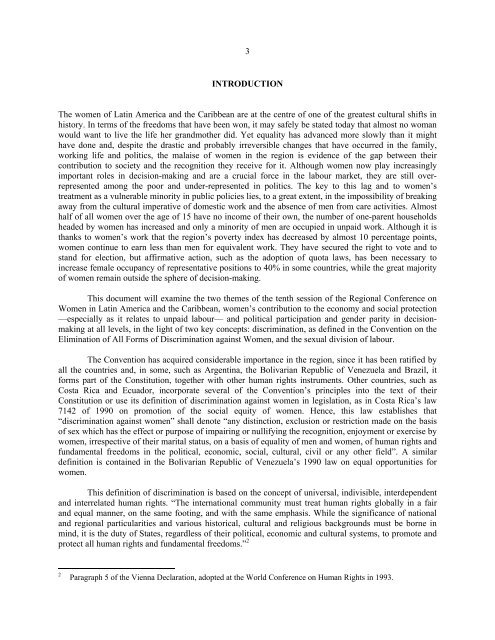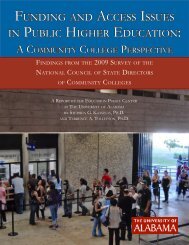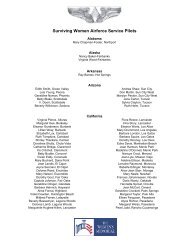Women in Latin America and the Caribbean - Cepal
Women in Latin America and the Caribbean - Cepal
Women in Latin America and the Caribbean - Cepal
Create successful ePaper yourself
Turn your PDF publications into a flip-book with our unique Google optimized e-Paper software.
3<br />
INTRODUCTION<br />
The women of Lat<strong>in</strong> <strong>America</strong> <strong>and</strong> <strong>the</strong> <strong>Caribbean</strong> are at <strong>the</strong> centre of one of <strong>the</strong> greatest cultural shifts <strong>in</strong><br />
history. In terms of <strong>the</strong> freedoms that have been won, it may safely be stated today that almost no woman<br />
would want to live <strong>the</strong> life her gr<strong>and</strong>mo<strong>the</strong>r did. Yet equality has advanced more slowly than it might<br />
have done <strong>and</strong>, despite <strong>the</strong> drastic <strong>and</strong> probably irreversible changes that have occurred <strong>in</strong> <strong>the</strong> family,<br />
work<strong>in</strong>g life <strong>and</strong> politics, <strong>the</strong> malaise of women <strong>in</strong> <strong>the</strong> region is evidence of <strong>the</strong> gap between <strong>the</strong>ir<br />
contribution to society <strong>and</strong> <strong>the</strong> recognition <strong>the</strong>y receive for it. Although women now play <strong>in</strong>creas<strong>in</strong>gly<br />
important roles <strong>in</strong> decision-mak<strong>in</strong>g <strong>and</strong> are a crucial force <strong>in</strong> <strong>the</strong> labour market, <strong>the</strong>y are still overrepresented<br />
among <strong>the</strong> poor <strong>and</strong> under-represented <strong>in</strong> politics. The key to this lag <strong>and</strong> to women’s<br />
treatment as a vulnerable m<strong>in</strong>ority <strong>in</strong> public policies lies, to a great extent, <strong>in</strong> <strong>the</strong> impossibility of break<strong>in</strong>g<br />
away from <strong>the</strong> cultural imperative of domestic work <strong>and</strong> <strong>the</strong> absence of men from care activities. Almost<br />
half of all women over <strong>the</strong> age of 15 have no <strong>in</strong>come of <strong>the</strong>ir own, <strong>the</strong> number of one-parent households<br />
headed by women has <strong>in</strong>creased <strong>and</strong> only a m<strong>in</strong>ority of men are occupied <strong>in</strong> unpaid work. Although it is<br />
thanks to women’s work that <strong>the</strong> region’s poverty <strong>in</strong>dex has decreased by almost 10 percentage po<strong>in</strong>ts,<br />
women cont<strong>in</strong>ue to earn less than men for equivalent work. They have secured <strong>the</strong> right to vote <strong>and</strong> to<br />
st<strong>and</strong> for election, but affirmative action, such as <strong>the</strong> adoption of quota laws, has been necessary to<br />
<strong>in</strong>crease female occupancy of representative positions to 40% <strong>in</strong> some countries, while <strong>the</strong> great majority<br />
of women rema<strong>in</strong> outside <strong>the</strong> sphere of decision-mak<strong>in</strong>g.<br />
This document will exam<strong>in</strong>e <strong>the</strong> two <strong>the</strong>mes of <strong>the</strong> tenth session of <strong>the</strong> Regional Conference on<br />
<strong>Women</strong> <strong>in</strong> Lat<strong>in</strong> <strong>America</strong> <strong>and</strong> <strong>the</strong> <strong>Caribbean</strong>, women’s contribution to <strong>the</strong> economy <strong>and</strong> social protection<br />
—especially as it relates to unpaid labour— <strong>and</strong> political participation <strong>and</strong> gender parity <strong>in</strong> decisionmak<strong>in</strong>g<br />
at all levels, <strong>in</strong> <strong>the</strong> light of two key concepts: discrim<strong>in</strong>ation, as def<strong>in</strong>ed <strong>in</strong> <strong>the</strong> Convention on <strong>the</strong><br />
Elim<strong>in</strong>ation of All Forms of Discrim<strong>in</strong>ation aga<strong>in</strong>st <strong>Women</strong>, <strong>and</strong> <strong>the</strong> sexual division of labour.<br />
The Convention has acquired considerable importance <strong>in</strong> <strong>the</strong> region, s<strong>in</strong>ce it has been ratified by<br />
all <strong>the</strong> countries <strong>and</strong>, <strong>in</strong> some, such as Argent<strong>in</strong>a, <strong>the</strong> Bolivarian Republic of Venezuela <strong>and</strong> Brazil, it<br />
forms part of <strong>the</strong> Constitution, toge<strong>the</strong>r with o<strong>the</strong>r human rights <strong>in</strong>struments. O<strong>the</strong>r countries, such as<br />
Costa Rica <strong>and</strong> Ecuador, <strong>in</strong>corporate several of <strong>the</strong> Convention’s pr<strong>in</strong>ciples <strong>in</strong>to <strong>the</strong> text of <strong>the</strong>ir<br />
Constitution or use its def<strong>in</strong>ition of discrim<strong>in</strong>ation aga<strong>in</strong>st women <strong>in</strong> legislation, as <strong>in</strong> Costa Rica’s law<br />
7142 of 1990 on promotion of <strong>the</strong> social equity of women. Hence, this law establishes that<br />
“discrim<strong>in</strong>ation aga<strong>in</strong>st women” shall denote “any dist<strong>in</strong>ction, exclusion or restriction made on <strong>the</strong> basis<br />
of sex which has <strong>the</strong> effect or purpose of impair<strong>in</strong>g or nullify<strong>in</strong>g <strong>the</strong> recognition, enjoyment or exercise by<br />
women, irrespective of <strong>the</strong>ir marital status, on a basis of equality of men <strong>and</strong> women, of human rights <strong>and</strong><br />
fundamental freedoms <strong>in</strong> <strong>the</strong> political, economic, social, cultural, civil or any o<strong>the</strong>r field”. A similar<br />
def<strong>in</strong>ition is conta<strong>in</strong>ed <strong>in</strong> <strong>the</strong> Bolivarian Republic of Venezuela’s 1990 law on equal opportunities for<br />
women.<br />
This def<strong>in</strong>ition of discrim<strong>in</strong>ation is based on <strong>the</strong> concept of universal, <strong>in</strong>divisible, <strong>in</strong>terdependent<br />
<strong>and</strong> <strong>in</strong>terrelated human rights. “The <strong>in</strong>ternational community must treat human rights globally <strong>in</strong> a fair<br />
<strong>and</strong> equal manner, on <strong>the</strong> same foot<strong>in</strong>g, <strong>and</strong> with <strong>the</strong> same emphasis. While <strong>the</strong> significance of national<br />
<strong>and</strong> regional particularities <strong>and</strong> various historical, cultural <strong>and</strong> religious backgrounds must be borne <strong>in</strong><br />
m<strong>in</strong>d, it is <strong>the</strong> duty of States, regardless of <strong>the</strong>ir political, economic <strong>and</strong> cultural systems, to promote <strong>and</strong><br />
protect all human rights <strong>and</strong> fundamental freedoms.” 2<br />
2<br />
Paragraph 5 of <strong>the</strong> Vienna Declaration, adopted at <strong>the</strong> World Conference on Human Rights <strong>in</strong> 1993.











